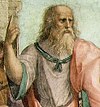Faidon
| Bagian dari seri tentang |
| Plato |
|---|
 |
| Perumpamaan dan metafora |
| Lihat pula |
Phædo atau Phaedo (/ˈfiːdoʊ/; bahasa Yunani: Φαίδων, Phaidōn, pengucapan Yunani: [pʰaídɔːn]), juga dikenal para pembaca kuno sebagai Tentang Jiwa,[1] adalah salah satu dialog terkenal dari zaman pertengahan Plato, bersama dengan Republik dan Simposium. Subyek filsafat dari dialog tersebut adalah keabadian jiwa. Karya tersebut dibuat pada jam-jam terakhir sebelum Sokrates menjemput ajal, dan dialog keempat dan terakhir buatan Plato yang menjelaskan hari-hari terakhir filsuf tersebut, setelah Euthyphro, Apology, dan Crito.
Catatan
sunting- ^ Lorenz, Hendrik (22 April 2009). "Ancient Theories of Soul". Stanford Encyclopedia of Philosophy. Diarsipkan dari versi asli tanggal 2019-03-23. Diakses tanggal 2013-12-10.
Referensi
sunting- Plato (1966) [1925]. "Phaedo, by Plato, full text (English & Greek)". Plato in Twelve Volumes. Diterjemahkan oleh Harold North Fowler. Introduction by W.R.M. Lamb. Cambridge, MA & London, UK: Harvard University Press & William Heinemann Ltd. Diarsipkan dari versi asli tanggal 2008-05-02. Diakses tanggal 2019-04-08.
- Gallop, David. (1996). "Introduction." Phaedo, vii–xxiii. Oxford: Oxford University Press.
- Gertz, Sebastian R. P. (2011). Death and Immortality in Late Neoplatonism: Studies on the Ancient Commentaries on Plato's Phaedo, Leiden: Brill.
- Irvine, Andrew David (2008). Socrates on Trial: A Play Based on Aristophanes' Clouds and Plato's Apology, Crito, and Phaedo Adapted for Modern Performance. Toronto: University of Toronto Press. ISBN 978-0-8020-9783-5.
ISBN 978-0-8020-9783-5 (cloth); ISBN 978-0-8020-9538-1 (paper); ISBN 978-1-4426-9254-1 (e-pub).
Bacaan tambahan
sunting- Bobonich, Christopher. 2002. "Philosophers and Non-Philosophers in the Phaedo and the Republic." In Plato’s Utopia Recast: His Later Ethics and Politics, 1–88. Oxford: Clarendon.
- Dorter, Kenneth. 1982. Plato’s Phaedo: An Interpretation. Toronto: Univ. of Toronto Press.
- Frede, Dorothea. 1978. "The Final Proof of the Immortality of the Soul in Plato’s Phaedo 102a–107a". Phronesis, 23.1: 27–41.
- Futter, D. 2014. "The Myth of Theseus in Plato's Phaedo". Akroterion, 59: 88-104.
- Gosling, J. C. B., and C. C. W. Taylor. 1982. "Phaedo" [In] The Greeks on Pleasure, 83–95. Oxford, UK: Clarendon.
- Holmes, Daniel. 2008. "Practicing Death in Petronius' Cena Trimalchionis and Plato's Phaedo". Classical Journal, 104(1): 43-57.
- Irwin, Terence. 1999. "The Theory of Forms". [In] Plato 1: Metaphysics and Epistemology, 143–170. Edited by Gail Fine. Oxford Readings in Philosophy. Oxford, UK: Oxford University Press.
- Most, Glenn W. 1993. "A Cock for Asclepius". Classical Quarterly, 43(1): 96–111.
- Nakagawa, Sumio. 2000. "Recollection and Forms in Plato's Phaedo." Hermathena, 169: 57-68.
- Sedley, David. 1995. "The Dramatis Personae of Plato’s Phaedo." [In] Philosophical Dialogues: Plato, Hume, and Wittgenstein, 3–26 Edited by Timothy J. Smiley. Proceedings of the British Academy 85. Oxford, UK: Oxford University Press.
Pranala luar
sunting| Sumber pustaka mengenai Phaedo |
- Karya yang berkaitan dengan Phaedo di Wikisource
- Kutipan tentang Phaedo di Wikikutip
- Approaching Plato: A Guide to the Early and Middle Dialogues Diarsipkan 2009-06-20 di Wayback Machine.
- Guides to the Socratic Dialogues Diarsipkan 2011-05-03 di Wayback Machine., a beginner's guide
- The grammatical puzzles of Socrates' Last Words Diarsipkan 2021-07-30 di Wayback Machine.
- Faidon catatan di Internet Encyclopedia of Philosophy
- Buku audio domain publik Phaedo di LibriVox
- Versi daring
- Benjamin Jowett, 1892: full text Diarsipkan 2023-06-04 di Wayback Machine.
- George Theodoridis, 2016: full text Diarsipkan 2023-06-29 di Wayback Machine.